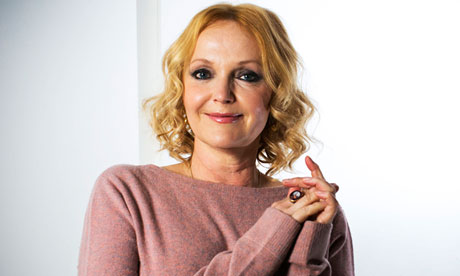Miranda Richardson is one of Britain's leading actors, and this year is chair of judges for the Women's prize for fiction. On one thing she is clear: leave Hilary Mantel alone, she's brilliant

Miranda Richardson: 'Discriminatory against? ... Oh! Men? Oh, bless!' Photograph: Felix Clay
Miranda Richardson was fully primed for a fight. Ahead of the recent meeting to decide the shortlist for the Women's prize for fiction – previously the Orange prize – the actor, chair of this year's judges, had her fists balled tight in defence of Hilary Mantel and her novel Bring Up the Bodies. Over the past six months, as Mantel racked up her second win in the Booker prize and her first in the Costa, before adding the David Cohen award – sometimes known as the "British Nobel" – to her haul last month, Richardson noticed a growing disdain for the writer's success, a swirling bitterness. "I so despised the backchat that I heard in relation to Bring Up the Bodies," she says, wrinkling her nose. "I picked up a very negative vibe, and it was very distasteful to me."
There have been increasing murmurs that Mantel doesn't need another prize, that less well-known writers could use the veneration instead. This undercurrent bubbled up ferociously in February, when an excellent, perceptive speech Mantel had given on society's treatment of royalty was selectively quoted in the tabloids, her comments about the Duchess of Cambridge described as vicious and venomous. (These articles conveniently ignored the essay's conclusion, which called for everyone "to back off and not be brutes" to Kate.) The hullabaloo was used by some as an excuse to kick Mantel in the most personal terms, to bring up her weight and infertility; an attempt, said the author later, to set her up as a hate figure.
Richardson was ready. If there's one thing she can't stand, it's anyone who demonises women, an outlook that has had a sizeable impact on her own career. In her early years in the spotlight, she was sent script after script that featured dodgy and demonic female characters – "'a woman with a knife who's after guys' kind of shit," she says. She was offered the Glenn Close role in Fatal Attraction, for instance, which could have made her name in Hollywood, and turned it down for this reason.
As it turned out, there was no need to defend Mantel against the judging panel, who backed the book – but afterwards, when the shortlist was announced, she dived in to answer detractors. Britain has a "hideous" attitude to success, she told the press, with people being "quite vitriolic [about Mantel] in some cases. I think it's disgusting, quite frankly. 'You've already had too much, you can't have any more. Go away and die now.'"
It was a surprising outburst from Richardson, who has never courted controversy or publicity. At 55, she's been well-known and respected for almost 30 years, after attracting worldwide attention for a stellar performance in the 1985 film Dance with a Stranger, as Ruth Ellis, the last woman to be hanged in Britain. Her star rose after that, despite her unwillingness to compromise on roles. There was her anarchic turn as Elizabeth I in Black-Adder II, and two Oscar nominations in quick succession in the 1990s for Damage, and Tom and Viv, and yet she has always managed to keep the press at arm's length. Writers have said she seems to find interviews akin to chewing glass, which left me expecting a prickly character.
More
There have been increasing murmurs that Mantel doesn't need another prize, that less well-known writers could use the veneration instead. This undercurrent bubbled up ferociously in February, when an excellent, perceptive speech Mantel had given on society's treatment of royalty was selectively quoted in the tabloids, her comments about the Duchess of Cambridge described as vicious and venomous. (These articles conveniently ignored the essay's conclusion, which called for everyone "to back off and not be brutes" to Kate.) The hullabaloo was used by some as an excuse to kick Mantel in the most personal terms, to bring up her weight and infertility; an attempt, said the author later, to set her up as a hate figure.
Richardson was ready. If there's one thing she can't stand, it's anyone who demonises women, an outlook that has had a sizeable impact on her own career. In her early years in the spotlight, she was sent script after script that featured dodgy and demonic female characters – "'a woman with a knife who's after guys' kind of shit," she says. She was offered the Glenn Close role in Fatal Attraction, for instance, which could have made her name in Hollywood, and turned it down for this reason.
As it turned out, there was no need to defend Mantel against the judging panel, who backed the book – but afterwards, when the shortlist was announced, she dived in to answer detractors. Britain has a "hideous" attitude to success, she told the press, with people being "quite vitriolic [about Mantel] in some cases. I think it's disgusting, quite frankly. 'You've already had too much, you can't have any more. Go away and die now.'"
It was a surprising outburst from Richardson, who has never courted controversy or publicity. At 55, she's been well-known and respected for almost 30 years, after attracting worldwide attention for a stellar performance in the 1985 film Dance with a Stranger, as Ruth Ellis, the last woman to be hanged in Britain. Her star rose after that, despite her unwillingness to compromise on roles. There was her anarchic turn as Elizabeth I in Black-Adder II, and two Oscar nominations in quick succession in the 1990s for Damage, and Tom and Viv, and yet she has always managed to keep the press at arm's length. Writers have said she seems to find interviews akin to chewing glass, which left me expecting a prickly character.
More

No comments:
Post a Comment